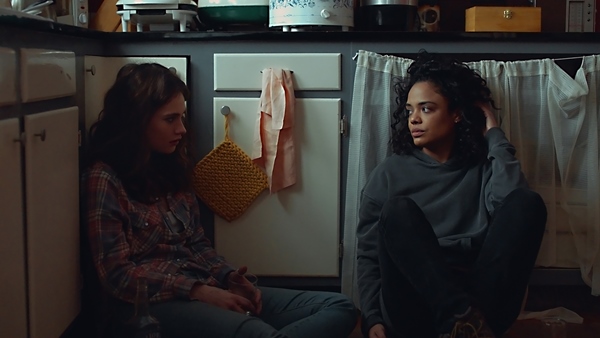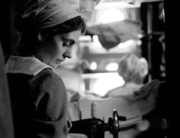“Your choices are as good as your options,” says Ollie (Tessa Thompson) to her sister, Deb (Lily James), who replies instantly that the same advice applies to her sibling. In a few days, Ollie’s probation will be over, and she will get back her full freedom. So it’s imperative that she stay clean and away from problems. In the past, Ollie (short for Oleander) was caught illegally running prescriptions pills to and from Canada from North Dakota. Carter (Lance Reddick), her probation officer, helps her find a new job and start a new life out of town. So Ollie’s options look more promising compared to her sister’s.
Deb is a single mother taking care of her son, while another baby is on its way. The father is an ex-boyfriend who barely helps her and often humiliates her. With one week to go before the sisters’ late mother’s home is foreclosed, Ollie commits to saving her family’s home. However, Deb’s bad choices lead to Ollie’s accepting dangerous options without second thought. That means an inevitable relapse to her previous crimes.
Written and directed by Nia Da Costa, Little Woods marks the debut of a new filmmaker concerned about social issues, marginalized people, and an urgent story of human interest in contemporary American. The film covers big themes, like the health care system, poverty, misogyny, abortion, and illegal jobs as a form of survival. Setting the movie in a border town may feel appropriate as a subtle and ironic commentary on how reckless the law is in both countries, although the illegal actions come from the Americans.
While Ollie tries to do anything she can to help her sister, Deb has her own struggles. Her main dilemma right now is to decide whether to bring another baby into this world or have an abortion. Both options are expensive, but abortion seems the more practical choice, but Da Costa doesn’t force an agenda. This a story about two flawed characters who only have themselves to defend against violence and hostilities, usually embodied by men.
While Deb’s problems fuel the plot, the movie belongs to Tessa Thompson. Or at the very least, it’s always better when it focuses on Ollie. Over the last few years, Thompson has proved to be a key supporting player who brings a warm heart and humanity to her roles, ranging from huge franchise blockbusters from Creed to Thor: Ragnarok to the big-budget TV series Westworld. Her presence and committed performance are the most engaging part of a movie that doesn’t always works.
Little Woods wants to make grand statements about society, and the coherence in the story often suffers because of that. It’s almost feels like two or three movies. Deb’s decision regarding an abortion has its own story line, while Ollie’s attempt to make enough movie to pay the mortgage is another. It’s unfortunate that Ollie’s story loses strength along the way. The last third barely reminds viewers of the risks and stakes in Ollie’s life.
It’s never a good sign when you watch a movie and you can barely describe one significant moment that makes it worthwhile. Little Wood leaves a vague impression after saying many important things about contemporary American life, but not one is fully explored. It’s more like experiencing moments you recognize from other movies. Consider yourself lucky if you remember anything specific hours later.
Released by NEON
USA. 105 min Rated R
With Lily James, Tessa Thompson, Luke Kirby, Lance Reddick, and James Badge Dale

















Leave A Comment